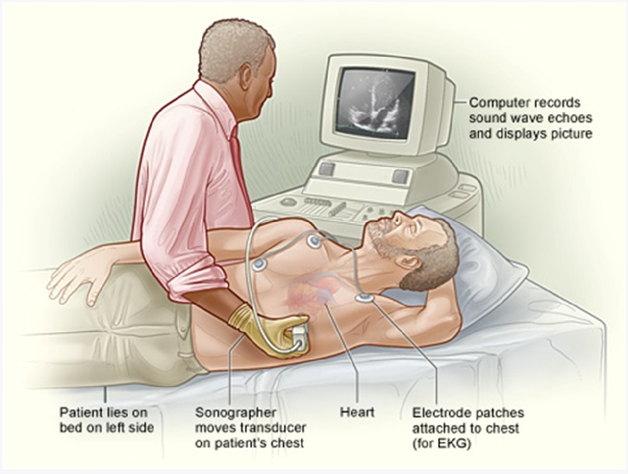A client with a complex cardiac history is scheduled for transthoracic echocardiography. What should the nurse teach the client in anticipation of this diagnostic procedure?
The test is noninvasive, and nothing will be inserted into the client's body.
The client's pain will be managed aggressively during the procedure
The test will provide a detailed profile of the heart's electrical activity
The client will remain on bed rest for 1 to 2 hours after the test
The Correct Answer is A
The nurse should teach the client that the transthoracic echocardiography is a noninvasive test and that nothing will be inserted into the client's body.
Transthoracic echocardiography is a diagnostic procedure that uses ultrasound to create images of the heart's structures and assess its function. It is a noninvasive test, meaning that it does not involve any insertion of instruments or devices into the body. Instead, a transducer is placed on the chest to obtain images of the heart.
The statement about managing pain aggressively during the procedure is not applicable to transthoracic echocardiography. It is generally a painless procedure that does not cause discomfort.
Transthoracic echocardiography primarily provides detailed images of the heart's structures and function, such as the chambers, valves, and pumping action. It does not specifically profile the heart's electrical activity, which is usually assessed using an electrocardiogram (ECG) or other specialized tests.
Regarding bed rest after the test, there is typically no need for bed rest following transthoracic echocardiography. The client can usually resume normal activities immediately after the procedure. However, the nurse should provide specific instructions based on the client's condition and any additional tests or interventions planned.

Nursing Test Bank
Naxlex Comprehensive Predictor Exams
Related Questions
Correct Answer is A
Explanation
Elevated levels of LDL (low-density lipoprotein) cholesterol are associated with an increased risk of coronary artery disease (CAD). LDL cholesterol is often referred to as "bad" cholesterol because it can contribute to the formation of plaque in the arteries, leading to narrowing and blockage of the arteries supplying the heart. This increases the risk of developing CAD and related complications such as heart attack and stroke.
On the other hand, HDL (high-density lipoprotein) cholesterol is often referred to as "good" cholesterol. HDL cholesterol helps remove excess cholesterol from the bloodstream and transport it back to the liver for processing and excretion. Higher levels of HDL cholesterol are associated with a decreased risk of CAD because it helps to prevent the accumulation of cholesterol on artery walls.
Therefore, understanding that increased LDL and decreased HDL levels increase the risk of coronary artery disease demonstrates a good understanding of the significance of cholesterol levels and their impact on cardiovascular health.
Correct Answer is D
Explanation
Helping to position a client for a portable x-ray generally involves physically assisting the client in moving into the appropriate position or adjusting their body as needed. This task can be safely delegated to the UAP as long as they have received proper training on how to safely assist with positioning and have a clear understanding of the specific instructions provided by the radiology department.
Assisting the client to take the beta-blocker involves administering medication, which falls within the scope of nursing practice and requires the nurse's expertise in medication administration and monitoring the client's response.
Transporting the client to the intensive care unit via a stretcher involves moving the client to another unit and may require additional monitoring and coordination of care during the transfer. This task is best performed by the nurse, who can assess the client's stability, ensure appropriate documentation, and communicate effectively with the receiving unit.
Providing discharge-teaching instructions to the client going home requires the nurse to provide information about medications, wound care, follow-up appointments, and other important instructions. This task involves comprehensive education and assessment ofthe client's understanding, and is best performed by the nurse to ensure accurate and complete information is provided.
Whether you are a student looking to ace your exams or a practicing nurse seeking to enhance your expertise , our nursing education contents will empower you with the confidence and competence to make a difference in the lives of patients and become a respected leader in the healthcare field.
Visit Naxlex, invest in your future and unlock endless possibilities with our unparalleled nursing education contents today
Report Wrong Answer on the Current Question
Do you disagree with the answer? If yes, what is your expected answer? Explain.
Kindly be descriptive with the issue you are facing.
